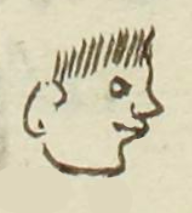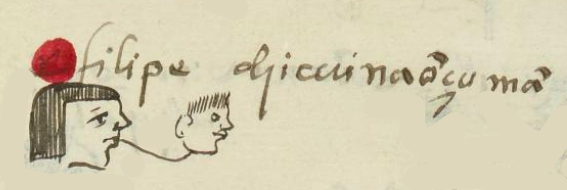Chiucnauhozoma (MH770r)
This black-line drawing of the simplex glyph for the personal name Chiucnauhozoma (or Chiucnahui Ozoma), "Nine Monkey," is attested here as a man's name. The glyph consists of an anthropomorphic head in profile, facing toward the viewer's right. Its hair stands up on its head, perhaps in a way reminiscent of a monkey (ozomatli). There are more than nine hairs, and there is no visual indication of the number nine that appears in the gloss (there are twelve hairs on the top of his head). This is a calendrical name that comes from the religious divinatory calendar of 260 days, the tonalpohualli. The day name here is ozomatli.
Stephanie Wood
This name is a day sign. Originally, a name like this would have a number attached to it. But calendrical names were evolving at the time of this manuscript (1560), often dropping their numbers. Calendrics figure importantly in Nahuas' religious views of the cosmos, and these names lived on well after colonization even as they evolved.
filipe chicuinaōçumā
Felipe Chicunauhozoma
Stephanie Wood
1560
Jeff Haskett-Wood
animales, fechas, calendarios, nombres de días, religión indígena, chiucnahui ozoma, nueve, números, monkeys, monos, calendarios, tonalpohualli, días, deidades, deities, divinities, divine forces, ozomatli, nombres de hombres

chiucnahui, nine, https://nahuatl.wired-humanities.org/content/chiucnahui
ozoma(tli), monkey, https://nahuatl.wired-humanities.org/content/ozomatli
Nueve-Mono, o 9-Mono
Stephanie Wood
Matrícula de Huexotzinco, folio 770r, World Digital Library, https://www.loc.gov/resource/gdcwdl.wdl_15282/?sp=614&st=image
This manuscript is hosted by the Library of Congress and the World Digital Library; used here with the Creative Commons, “Attribution-NonCommercial-ShareAlike 3.0 License” (CC-BY-NC-SAq 3.0).







